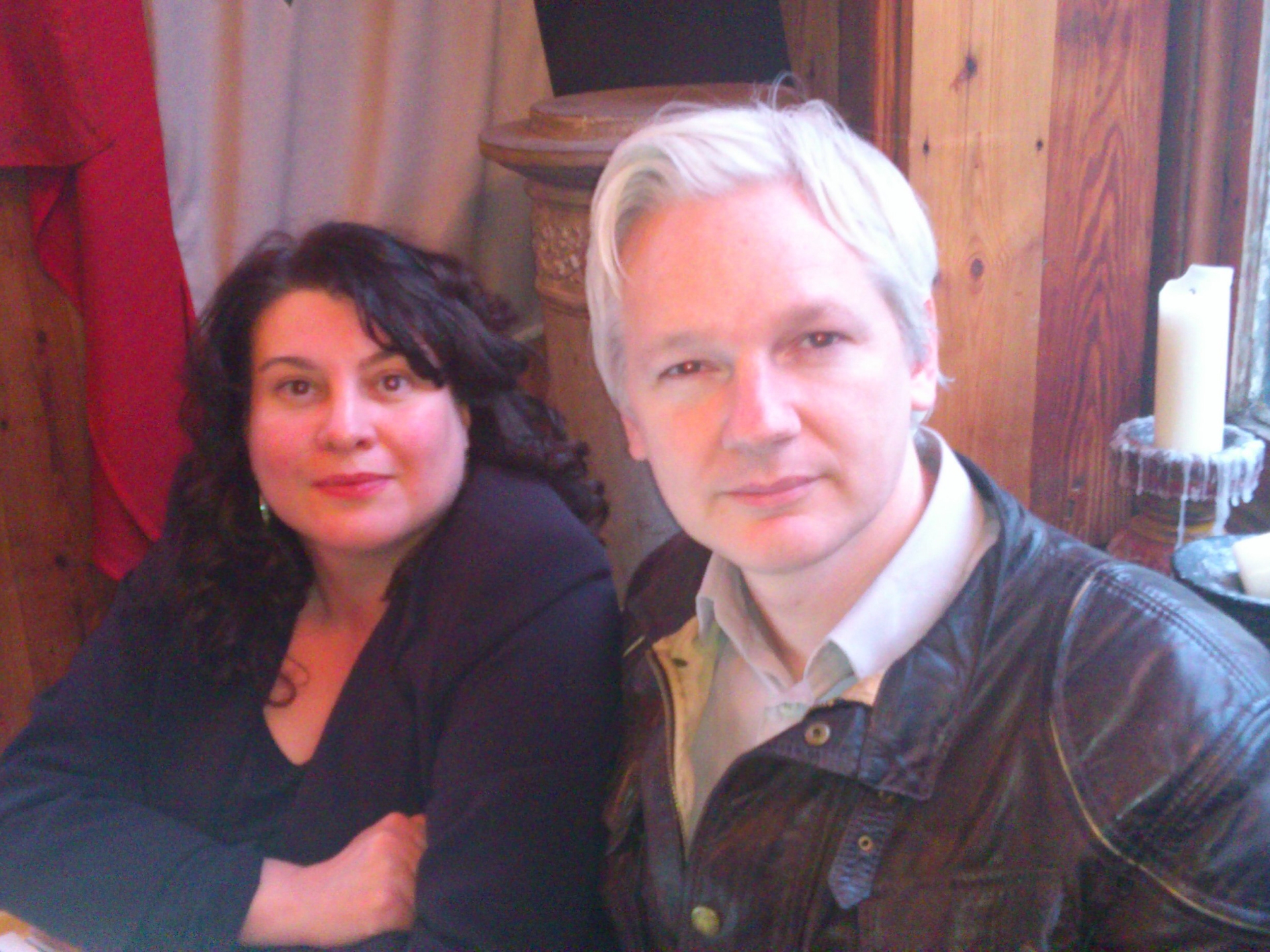Investigative journalist Stefania Maurizi has been partnering with WikiLeaks for more than 12 years.
She has worked for some of Italy’s top publications and is currently at the Il Fatto Quotidiano newspaper.
Years ago, she helped expose Rome’s role in the United States and NATO-led so-called “war on terror”, sifting through thousands of classified United States government documents leaked by the whistleblowing organisation from 2010 onwards.
Today, the 51-year-old Australian founder of the group, Julian Assange, is held in a maximum security prison in the United Kingdom, as his lawyers continue their fight to avoid his extradition to the US, where he could face up to 175 years in prison.
Assange and WikiLeaks have been charged by the US government for hacking websites and leaking classified documents related to the wars in Iraq and Afghanistan, as well as US diplomatic cables.
Maurizi’s new book, Secret Power: WikiLeaks and its Enemies, published by Pluto Press, examines the legal cases against Assange, the state of journalism, and the need for official transparency.
Al Jazeera: If Assange is extradited to the US, what does this mean for journalists?
Maurizi: If Julian Assange gets extradited to the US, it will have a devastating effect on press freedom, and not just press freedom. This is not just a case about journalists. It is a case about the right of the people to know what our governments are doing in dark corners where there are no witnesses.
If you are not able to reveal state criminality at the highest level, you cannot say that you are living in a democracy. You are living in a state which might not be completely authoritarian, like dictatorships, but is still authoritarian enough that you cannot know what they are doing.
What can we do? I really do believe we have a duty to expose how serious this monstrous injustice is. We have a duty to inform the public. We have a duty to expose the cruelty of his [Assange] treatment. They are killing him slowly.
His father [John Shipton] was in Italy recently. He received an honourary card by the Order of Italian Professional Journalists in Rome on behalf of Assange … I spoke to him and he was devastated. He told me Julian is dangerously thin.
Al Jazeera: Have you met Assange since his imprisonment?
Maurizi: I do not have any access to him, and so far, the visits are only allowed for the legal team, for his family members, but not for me and other journalists.
The last time I met him was November 2018, five months before he was arrested. I found him in a very serious condition. He was heavily burdened … he had lost maybe 15 kg (33lb). But he was still lucid. He told me he would be arrested and extradited.
Al Jazeera: At one point in your book, you recall being worried when travelling from Berlin to Rome having just worked with WikiLeaks. You had with you a small section of the Afghan war logs. Have you ever felt fearful about your involvement?
Maurizi: I never feared for my life. If you take my country Italy, for example, we have dozens of journalists who live under protection due to Mafia threats. They kill journalists because they have no other tools other than violence.
In my case, I don’t believe a risk is there because [government officials] have several tools. They don’t have just violence as a tool. They use things like political and diplomatic pressure. Many journalists stopped working on WikiLeaks because they thought it was damaging for their careers. They could lose access to state officials. They could have their careers damaged.
But yes … I have been followed aggressively, and it is not a nice thing to experience, especially when you are abroad and alone. I have been physically attacked (Editors’s note: Maurizi writes in her book that she was once robbed in Rome) and have had very important documents stolen which never surfaced again.
I can assure you that this work hasn’t gained me any powerful friends or allies. It set me on a collision course with my former newspaper, la Repubblica, from which I resigned after 14 years so that I could keep doing my investigative work on WikiLeaks. I resigned, and my income collapsed, but I would do it again. Compared to the hardships Assange has gone through, my troubles are nothing.
Al Jazeera: You claim that WikiLeaks has “radically transformed journalism”? How so?
Maurizi: First of all, they made these documents accessible and provided a reasonably secure platform for whistleblowers who wanted to leak, because one of the problems is that in traditional media, people still use old-fashioned technologies like mobile phones and emails, which are totally vulnerable.
Also, they made these documents available to billions.
They [WikiLeaks] don’t just publish revelations, like national security journalists, they make the actual documentation available to everyone, so that anyone can make up their own mind.
Everyone can check whether a journalist has distorted or censored anything. This is about democratising information, democratising access to information. It is about making the relationship between readers and journalists less asymmetric.
This is not just a revolution in journalism, but a revolution in the access available for [everyday citizens] to important information. You have to be able to access this information in order to have proper democratic participation in public life.
Al Jazeera: Assange’s critics are vocal. They call him a “hacktivist” and say the work of WikiLeaks is far from journalism. What do you make of these characterisations?
Maurizi: It’s completely false. He is clearly a journalist, and we cannot allow the state to decide who is and who is not a journalist.
Of course, the US government has tried to undermine these journalistic protections, because they know that as long as he has journalistic protections, it will be very hard for them to charge him. And that’s why the US government is pressing the argument that he is not a journalist, but maybe a hacker or activist.
We have seen in the last three years all major news organisations have characterised him as a journalist, even the International Federation of Journalists.
So what the United States is doing is using a fear tactic. They are just trying to bypass the press protection. This is indeed what [Benito] Mussolini did in Italy. Mussolini created the system in which the state decided who is a journalist and who is not, in order to control the press.
Al Jazeera: The US government and some observers accuse Assange of recklessness, claiming leaks could lead to attacks.
Maurizi: These documents were published in 2010. Twelve years later, the US authorities cannot name a single person who has been killed, who has been injured, who has been put in prison as a result.
Immediately after Julian Assange started and WikiLeaks started publishing the Afghan war logs, the state department, the Pentagon, the CIA, created this huge task force to check whether anyone had been injured, to check the names which have been published, and after 12 years, they haven’t been able to provide a single example.
Imagine if they had found a single example, they would have disseminated it worldwide.
Al Jazeera: The whistleblower Chelsea Manning, who leaked the Iraq and Afghan war logs, faced jailed time. What does this mean for the future of whistleblowing?
Maurizi: The aggressive persecution and prosecution of people like Assange and Manning send a message to whistleblowers and journalists that you have to be very careful because if you go ahead with this … your life will be destroyed.
On the other hand, it is quite encouraging that after Chelsea Manning, we had Edward Snowden. And after him, we had whistleblowers like Reality Winner and Daniel Hale.
So, we still have people who listen to their conscience and go ahead, so I’m still optimistic. That’s why I absolutely want Assange to win his case. I’m convinced that if he does, this will be a big step towards a society in which you can reveal state criminality at the highest level and be free and safe.
This interview was edited for clarity and brevity.
Sumber: www.aljazeera.com
 Skip to content
Skip to content


